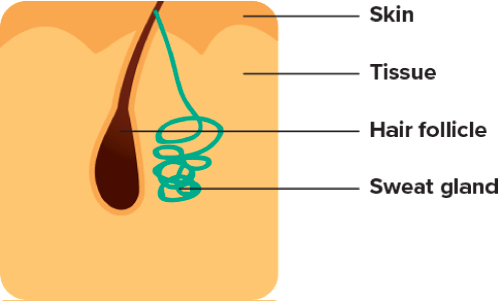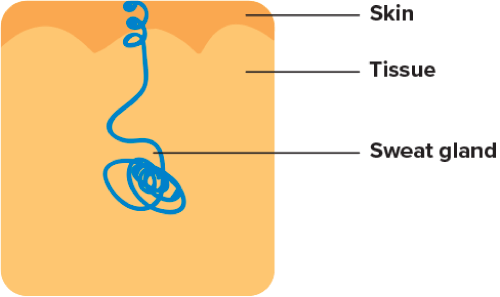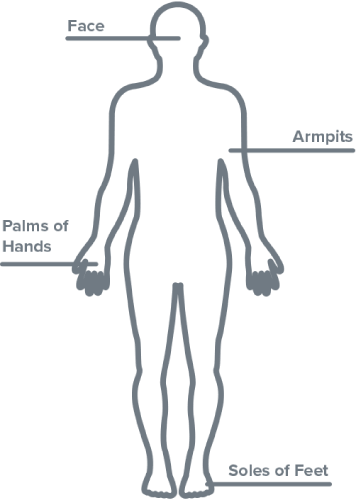Body Odor Explained: Why It Happens and How to Control It
Struggling with body odor (B.O)? You’re not alone. Sweat itself is odorless, but when it meets bacteria, things get funky. From diet to hygiene habits, many factors influence your scent. The good news? With the right approach, you can stay fresh all day. Let’s dive into the science—and solutions—of B.O..
What Is Body Odor?
B.O. is the unpleasant or distinctive smell produced when sweat interacts with bacteria on the skin. It typically arises from areas with a high concentration of sweat glands, such as the armpits and feet which is why we associate B.O. with sweat.
B.O is influenced by factors like hygiene, diet, hormones, medical conditions and genetics.
While B.O. is normal, extreme B.O. can be classified as a medical condition, known as bromhidrosis, osmidrosis or ozochrotia.
The Science Behind Body Odor
While sweat is actually odorless, B.O. occurs when sweat reacts with bacteria on your skin.
Let’s unpack the science behind sweat and ultimately B.O..
Your body has two types of sweat glands: eccrine and apocrine.
Eccrine glands are found all over the body and help regulate temperature by releasing sweat, mostly composed of water, with small amounts of salt and ammonia. This type of sweat is typically odorless.

Apocrine glands, on the other hand, are concentrated in areas like the armpits, breasts, genitals, eyelids, and ears. These glands become active during puberty and produce a milky fluid rich in proteins and lipids. When bacteria break down this fluid, they release the distinct smell known as B.O..

But why do humans produce B.O.? Research suggests an evolutionary link. Since apocrine glands activate during puberty and are clustered near the sex organs, some scientists believe B.O. plays a role in mating. Others theorize that it helps humans recognize blood relatives, including parents and siblings, through scent.
You’re most likely to experience B.O. in these areas:
-
Armpits
-
Feet
-
Groin
-
Genitals
-
Belly button
-
Behind the ears
-
Pubic hair and other hair

Body Odor Through Different Life Stages
B.O. evolves throughout life due to hormonal changes, gland activity and lifestyle factors. Here’s how it shifts across different life stages:
Infancy and Childhood
Babies and young children typically don’t have B.O. because their apocrine glands remain inactive. Sweat is primarily produced by eccrine glands, which regulate body temperature but don’t cause odor.
Puberty
B.O. is triggered during puberty by hormonal changes. Between the ages of 8-13 in girls and 9-15 in boys, glands in the groin and armpit areas start secreting a protein- and lipid-rich fluid that bacteria break down, leading to the onset of B.O..
This is why preteens and teenagers often notice a sudden need for deodorant.
Adulthood
B.O. stabilizes during adulthood but can vary based on diet, hygiene, stress levels and overall health. Hormonal fluctuations—such as those from pregnancy or menstruation—can temporarily alter B.O., making it stronger or different.
As people age, apocrine gland activity declines, often leading to a less intense B.O..
Menopause
Along with hot flashes and night sweats, body odor is another bothersome symptom of menopause.
Many women notice a change in their body odor during menopause. A dip in estrogen can trigger night sweats and hot flashes, causing increased sweat and body odor.
Many women also experience anxiety or stress during menopause, which can also lead to unwanted odor.
What Causes Body Odor?
Unfortunately, many factors play a role in B.O. production. Common causes of B.O. include medical conditions, high stress levels, personal hygiene habits, diet and lifestyle.
Let’s dive deeper into each of these B.O. causes.
Medical Conditions
B.O. can be influenced by various medical conditions and medications. Understanding these factors is essential for effective management.
-
Hyperthyroidism: Sweat and B.O. can be a result of an overactive thyroid. When you have an overactive thyroid, your body produces an abundance of sweat, even if you aren’t physically exerting yourself. Your doctor can test your blood or urine to see if you have hyperthyroidism.
-
Diabetes: Diabetes patients may experience a sudden change in smell or B.O., due to high levels of blood glucose. The liver produces chemicals (ketones) that make their way through blood, urine or breath and can alter B.O..
-
Obesity: Those who are overweight or obese tend to sweat more. Fat insulates the body and raises its core temperature, causing increased sweat production and B.O.. Obesity can also decrease airflow in sweaty areas, giving odor-causing bacteria the perfect climate to breed.
-
Genetic Disorders: While rare, gene mutations can also affect B.O.. Trimethylaminuria is a condition where your body can’t break down the chemical compound, trimethylamine. As a result, the compound builds up in your body and is released through sweat, urine and breath.
-
Hyperhidrosis: Hyperhidrosis is characterized by excessive sweating, which can lead to increased body odor. This condition may be primary (without an underlying cause) or secondary (resulting from another medical issue). Treatment options include prescription-strength antiperspirants, botulinum toxin injections, and, in severe cases, surgical interventions.
-
Liver and Kidney Diseases: Liver and kidney diseases can result in the accumulation of waste products in the body, leading to distinctive B.O.. For example, kidney failure may cause a urine-like or ammonia-like smell, while liver disease can produce a musty odor.
In addition to medical conditions, some medications can also alter your B.O.. For example:
-
Antidepressants: Some antidepressants, such as fluoxetine, paroxetine, and venlafaxine, can increase sweating, leading to changes in B.O..
-
Antihypertensives: Medications like clonidine, used to treat high blood pressure, may cause excessive sweating, contributing to B.O..
-
Antipsychotics: Certain antipsychotic drugs can lead to increased sweating, which may result in changes in B.O..
-
Anticholinergics: Medications with anticholinergic properties can reduce sweating, potentially leading to dry skin and an increased risk of bacterial growth, which may alter B.O..
-
Antibiotics: Some antibiotics can disrupt the normal balance of bacteria on the skin, leading to changes in B.O..
High Stress Levels
Have you noticed that stress sweat smells worse than your typical post-workout stench? That’s because stress sweat originates from the apocrine glands, which produce proteins that bacteria love.
A 2022 study examined how emotional changes, including stress, affect skin odor and its impact on others. The researchers found that stress-induced sweat has a distinctive odor, which can be perceived by others and may influence social interactions. Another research indicates that stress sweat has a unique scent. The participants identified the odor of stress sweat as "similar to stir-fried leeks," suggesting that stress-induced sweat has a characteristic smell that differs from other types of sweat.
Personal Hygiene Habits
Practicing good personal hygiene habits can keep B.O. at bay.
Regular showers remove sweat, bacteria, and dead skin cells, preventing unpleasant smells. Using antibacterial soap and deodorants or antiperspirants helps fight odor-causing bacteria and control sweating.
Additionally, wearing clean, breathable clothing reduces sweat buildup, while shaving or trimming body hair limits areas where bacteria can accumulate. Lastly, don’t forget oral hygiene—bad breath can contribute to overall B.O..
Read more: How to Stop Sweating So Much [14 Proven Solutions]
Diet
Certain foods, along with caffeine and alcohol consumption, can intensify unpleasant B.O..
Your liver metabolizes most of the alcohol you drink and excretes it through your urine. But if you drink too much or too fast, your liver has difficulty processing the alcohol. Instead, your body releases the excess alcohol through your breath and pores, resulting in stinky B.O..
Caffeine can also affect B.O.. Caffeine causes dry mouth, which can amplify bacteria and odor. Additionally, hot, caffeinated beverages can raise your body temperature and cause you to sweat more, leading to an increase in B.O..
Here are a few foods and diets that cause B.O.:

Cruciferous Vegetables: Broccoli, cabbage, cauliflower and Brussels sprouts contain sulfur, which your body absorbs and secretes through your sweat glands.

Spicy Foods: Spices like curry and cumin can get trapped in your pores and emit a strong, unpleasant odor.

Refined Sugar: Foods high in refined sugar can lead to yeast overgrowth. Having an abundance of intestinal yeast causes sugars to convert into alcohols that contribute to B.O.

Fish: Certain fish like salmon and tuna contain choline, a member of the B-complex vitamin family that emits a naturally fishy smell. Some people who eat a serving of fish will secrete choline in their sweat for up to a day.

Red Meat: The amino acids in red meat leave behind a residue in your intestines. Internal enzymes break down the residue, which then mixes with bacteria on your skin and intensifies your body odor when you sweat.

No-Carb or Low-Carb Diet: When you cut back on carbs, your body starts burning fat for energy. This process produces a chemical that can make your sweat smell like nail polish remover or fruity.
How to Keep Body Odor Under Control
In most cases, B.O. is treatable and manageable. Follow these expert tips to get rid of bad B.O.:
1. Refine Your Personal Hygiene Routine
Small changes to your hygiene can reduce B.O.:
-
Shower daily, especially after exercise.
-
Use antibacterial soap on sweaty areas like your armpits and groin to kill odor-causing bacteria.
-
Trim or shave your armpits—research shows less hair can reduce sweat and odor.
-
Launder clothes regularly and wash workout gear after use.
-
Replace towels, loofahs, and washcloths frequently to avoid bacteria buildup.
2. Use the Right Deodorant

Deodorants eliminate bacteria that cause odor. Look for products that reduce sweat, fight bacteria, and neutralize odor for the best results.
Read more: How to Get Rid of Armpit Odor: 11 Ways to Stay Fresh
3. Apply a Stronger Antiperspirant

For heavy sweaters, prescription-strength antiperspirants with high aluminum chloride concentrations can block sweat production and reduce odor. Less sweat = less bacteria to feed on.
4. Wear Anti-Odor Clothing

The fabric of your clothes matters:
-
Avoid synthetic fibers like polyester that can trap moisture, making odor worse.
-
Opt for natural fibers like cotton, wool, or silk, which allow sweat to evaporate, reducing B.O.
-
Consider anti-odor shirts like Thompson Tee’s Premium Anti Odor Shirt, which uses natural, non-toxic technology to eliminate 99.9% of odor-causing bacteria.
5. Modify Your Diet

Eat:
- Fruits and non-sulfurous vegetables
- Yogurt
- Kombucha
- Pickles
- Kefir
- Fresh sauerkraut
- Herbs
Avoid:
- Spicy foods like curry
- Garlic and onion
- Too much red meat
- Sulfurous vegetables like broccoli, cabbage and cauliflower
- Processed foods
6. Try Natural Home Remedy Hacks
Kitchen and bathroom items can help:
Witch hazel is a natural astringent. It contracts your skin’s tissues and reduces the amount of sweat you produce. Most witch hazel extracts also contain rubbing alcohol, which helps fight odor-causing bacteria.
Douse a cotton ball with apple cider vinegar and apply it on your underarms after showering.

Apple cider vinegar is antimicrobial and naturally acidic. It destroys smelly bacteria by balancing out the pH level of your skin.
Douse a cotton ball with apple cider vinegar and apply it on your underarms after showering.

Lemon juice is another acidic ingredient that neutralizes your underarm area and fights smelly bacteria.
Rub half a lemon directly on your armpits once daily. If your skin is extra sensitive, you can mix equal parts lemon juice and water to dilute the solution.

Apply acidic remedies only to clean, dry skin and avoid them on cuts or irritated skin.
When to See a Doctor About Your Body Odor
Sweating and B.O. are completely natural, but when they begin to interfere with your daily life, it might be a sign of an underlying health issue.
Bromhidrosis (also known as osmidrosis) is a condition characterized by chronic, foul-smelling B.O. Those with bromhidrosis tend to produce excessive sweat and the bacteria responsible for the odor. The smell is often described as cheese-like or onion-like, commonly affecting areas like the armpits and groin.
Another rare condition, Trimethylaminuria (TMAU), also known as fish odor syndrome, is a metabolic disorder that causes the compound trimethylamine to be released in sweat, urine, and breath, resulting in a strong fishy odor.
Consult your doctor if you experience any of the following:
-
Sweating at night.
-
Increased sweating without any obvious cause.
-
Cold sweats.
-
Sweat or odor that disrupts your daily activities.
-
A noticeable change in your body’s usual scent. A fruity or bleach-like odor could indicate early signs of conditions like diabetes, liver disease, or kidney disease.
*PLEASE NOTE: Always consult with a qualified medical professional if you’re concerned about changes in your body odor. This information should not be used as a substitute for professional medical diagnosis or treatment.


